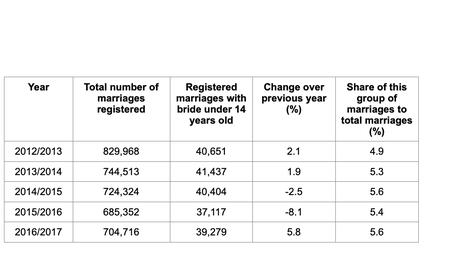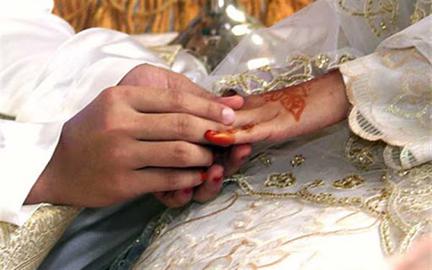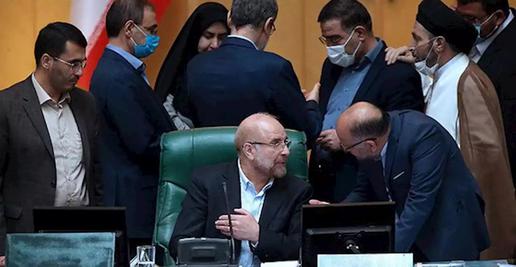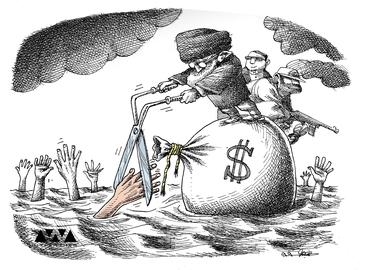"Why should I say yes?"
Many mothers are faced with this question from their little girls, who want to know why marriage is a good thing. Child marriage has many opponents in Iran, including in parliament, where representatives in the past have tried unsuccessfully to change the law and stop the practice. However, one by one, the Guardian Council has removed these opponents from parliament, disqualifying them from running when the next election came around. Eventually, the council has formed a parliament that not only does not oppose child marriage, but actually voices complaints that the government has made it more difficult for children under the age of 18 to get a loan for marriage. People under this age are no longer on the priority list for such loans.
A Closed Case
Members of the sixth parliament (2000-2004) were perhaps the first to be sensitive to the issue of child marriage. Attempting to amend the law, they proposed that the minimum age girls could marry be set at 15, and 18 for boys. Parliament approved the amendment, but the Guardian Council said it was against sharia law.
Parliamentarians who sought to resolve the issue insisted the bill be referred to the Expediency Council. But the Expediency Council upheld the Guardian Council's decision, although it ruled that marriage of girls before the age of 13 and marriage of boys before the age of 15 would require a court order. Essentially, the council made the situation more difficult for the parents legally, but it did not prevent children from getting married.
"Unfortunately, there are underage marriages, especially in the border and deprived areas of the country," said Mohammad Kazemi, Malayer's MP in the sixth and tenth (2016-2020) parliaments, and deputy chairman of the parliament Legal and Judicial Committee. "This type of marriage can take place in an unregistered manner and informally."
So this means that the rule requiring parents to register their children’s marriages via court order has had no impact on the problem. Parents allow their children to marry without securing a court order and even without legally registering the marriage.
The majority of MPs in the 2000-2004 parliament who sought to amend the child marriage law were then disqualified and so the matter was not pursued in the next parliament. Some candidates who had been approved either did not then serve in parliament after 2004 or did not find an opportunity to raise the issue during that term.
Between 2016 and 2020, parliamentarians once again raised the matter in public sessions. Qom authorities, including Ayatollah Nasser Makarem Shirazi, issued a fatwa stating that the marriage of girls below the age of 13 and boys under the age 15 was invalid, and this was then put before MPs for immediate approval as part of a public session. However, it was rejected by the Legal and Judicial Committee of the parliament, again because it was said to contradict Sharia law. And again, politicians wanting to change the law were unsuccessful.
"We introduced a minor amendment to the ban on marriage under the age of 13 and did not even discuss the issue of raising the age of marriage at all, but unfortunately it did not get enough votes," said Tayebeh Siavoshi, a Tehran MP at the time and a member of the 10th Majlis Women's Faction.
According to Siavoshi, MPs had already met with the authorities and had been presented with a fatwa, making sure the proposal was not against Sharia law. However, the Parliament's Legal and Judicial Committee, the specific committee examining the bill, voted against it. Tayebeh Siavoshi promised to do her best to solve this problem, but she, like so many supporters of the plan, was disqualified as a candidate in 2020 and so could not pursue the issue in the 11th parliament, which runs until 2024.
So why was the plan, the urgency of which had been publicly approved, rejected by the Legal and Judicial committee? "Some members of the Velayat-e Faqih (conservative principlists) faction, who previously supported the plan to ban the marriage of children under the age of 13 have now turned against it," said Parvaneh Salahshouri, another Tehran MP who supported the proposed legislation. "They seem to have been told by a 'special institution' to oppose the plan."
Salahshouri is most likely referring to the Guardian Council, an institution that has the power to determine the eligibility of candidates and to remove disobedient members from parliament.
Child marriage: Serious Challenge in Four Provinces
Although child marriage is primarily recognized as being practiced in deprived provinces and poor areas around the world, it is prevalent throughout Iran. Statistics from the National Registry Office show that on average, at least 40,000 children under the age of 14 get married each year.
Marriages of Under-14-year-olds From 2012 to 2017

The former MP for Malayer claimed that in most cases, child marriages are not registered. If this is true, it must be accepted that the number of child marriages is actually much higher than official figures suggest.
A study by IranWire reveals that in at least four provinces in Iran — East Azerbaijan, Zanjan, Hamedan, and North Khorasan — child marriage is among the top five major and pressing challenges affecting people’s lives. In other words, for at least 36 representatives in the current parliament, child marriage is a serious problem in their constituency. And yet it is not only these 36 MPs that have to deal with this key issue. It is a problem for any individual representing a constituency, chiefly because the practice continues and it is not recognized as a problem. In some cases, it has been seen as a positive aspect of society, even presenting an opportunity to increase population since children, once married, will be able to have children of their own. Some clerics and politicians believe actively increasing the population in Iran would be a positive step.
Nasrollah Pejmanfar, head of the Article 90 Committee of the 11th parliament, is among the group of MPs protesting against the government’s decision to bar children under the age of 18 from obtaining marriage loans. "A significant part of successful marriages in the country are among those married under the age of 18,” he says. “Therefore, this decision of the government is a very bad measure. It prevents many marriages and deprives the Iranian people of their legal rights. This government decree is against Sharia, because no one can set an age for marriage and deprive people of the minimum facilities for marriage under the pretext of age. According to Islamic law and custom, in many of our cities and villages, marriage under the age of 18 is valid."
In many cases, this thinking has replaced the opposition to child marriage that had characterized at least one faction of the 11th parliament.
Mehdi Asgari, representative for Karaj, which faces the challenge of overpopulation, is determined to resolve the population issue in his constituency. In addition, he has appealed to the president, protesting against the payment of subsidies for newborns being subject to approval by the Ministry of Cooperatives, Labor and Social Welfare. Other MPs have also raised this issue, including Mashhad representative Fatemeh Rahmani.
Studies show that the view of the current parliament is dominated by MPs wanting to encourage Iranians to have more children and who promote a boost in the population at any cost. The current environment does not welcome attempts to amend the law regarding child marriage, or discussion of issues that affect marriage and childbearing statistics.
Opponents of child marriage seem to have been ousted from parliament for the time being. No opposing voice has been heard in parliament in the six months that have passed since the 11th parliament was instated. Until further notice, the case for child marriage issue is closed, and until a politician who advocates reform is qualified by Iran’s Guardian Council to run for election, it will remain so.
visit the accountability section
In this section of Iran Wire, you can contact the officials and launch your campaign for various problems


























comments